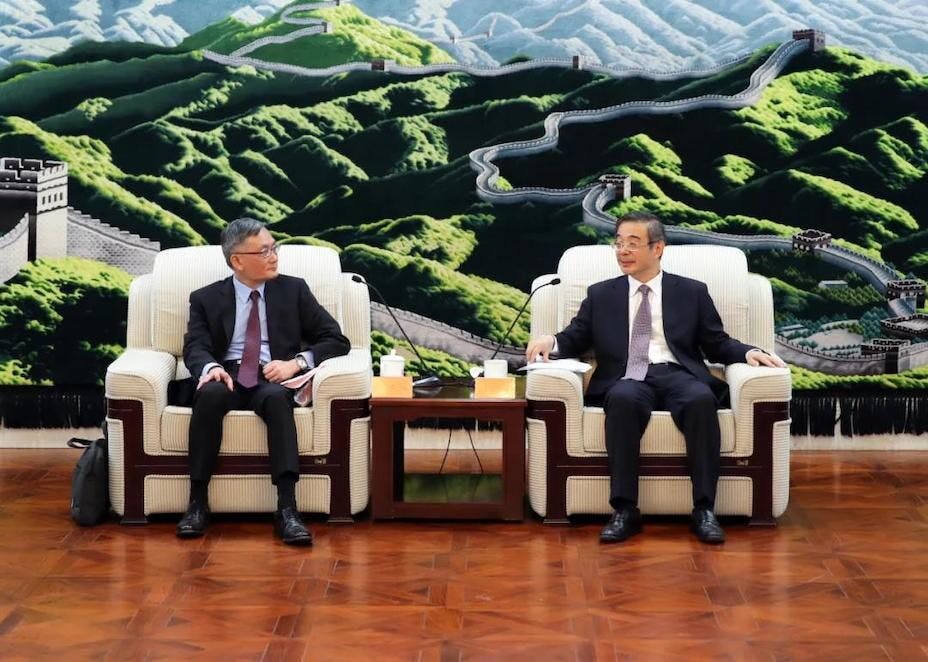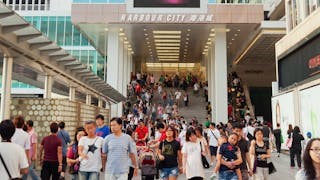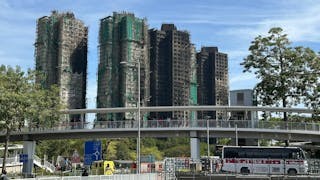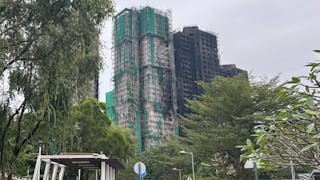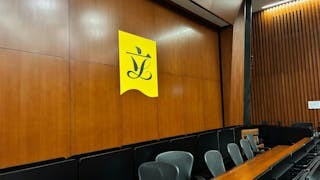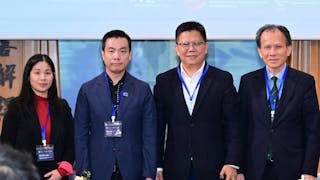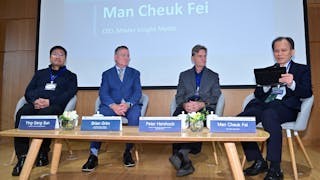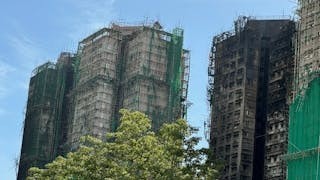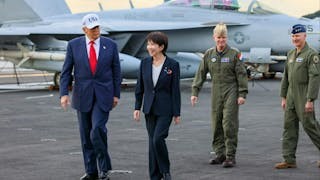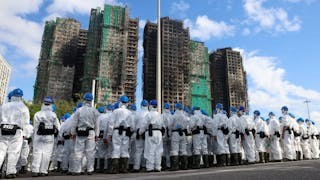由終審法院首席法官張舉能率領的司法機構代表團,5月18日至21日訪問北京,與全國人大常委會、最高人民法院、最高人民檢察院及港澳辦等會面,意義重大,這不僅是因為傳媒高調的報道,更因為不久前有關香港司法改革的討論,賦予這次訪問新的背景和內容。
這次禮節性訪問是張舉能就任終審法院首席法官後首次訪問北京。陪同他訪京的還包括:高等法院首席法官潘兆初、高等法院上訴法庭法官朱芬齡及司法機構政務長梁悅賢。
香港高級司法官員訪京開啟嶄新雙向交流模式
張舉能在北京會見了最高人民法院院長周強,並參訪了最高人民法院知識產權法庭和北京互聯網法院,就科技應用和司法交流等議題進行討論,亦拜訪了全國人民代表大會常務委員會辦公廳及法制工作委員會、香港特別行政區基本法委員會、最高人民檢察院、司法部和國務院港澳辦,就諸如技術應用和司法交流等問題交換意見。
5月19日,全國人大常委會秘書長楊振武會見了張舉能一行,法制工作委員會主任、香港基本法委員會主任沈春耀,法制工作委員會副主任、香港基本法委員會副主任張勇參加會見。從這次會晤的與會者可以推斷,負責香港《基本法》的內地高官與香港特別行政區的高級司法官員交換了意見,這是一種罕見的,但也許是一種嶄新而重要的交流方式。
親北京的傳媒報道,楊振武歡迎訪京團,並指出張舉能就職後首次率團訪京,充分體現了他對推動並加強香港和內地司法領域交流合作的積極態度。楊振武希望今後這樣的訪京活動能夠多一些。
更為重要的是,楊振武向訪京團介紹了習近平法治思想的「豐富內涵」和人民代表大會制度,希望香港法官能夠深刻理解憲法和《基本法》共同構成特別行政區憲制基礎這一論斷的「實質內涵」,「正確理解憲法、香港《基本法》、《香港國安法》和全國人大及其常委會有關決定的重大意義,全面落實『愛國者治港』原則,充分發揮司法機構的重要作用,維護國家主權、安全、發展利益,維護香港長期繁榮穩定」。
5月20日,司法部部長唐一軍會見了張舉能一行。唐一軍介紹了全面依法治國所取得的重大進展和成就。他指出,「當前我們正在深入學習貫徹習近平法治思想,堅持黨的領導、人民當家作主、依法治國有機統一,依法治國、依法執政、依法行政共同推進,法治國家、法治政府、法治社會一體建設,統籌推進科學立法、嚴格執法、公正司法、全民守法,不斷開創全面依法治國新局面」。唐一軍顯然是以高級司法官員的身份,向訪京團介紹中國司法的新思維。
唐一軍表示,近年來,司法部與香港司法法律界一直保持良好合作和交流,希望內地司法行政機構與香港司法法律界進一步加強溝通,深化交流,共同為全面、準確、有效實施憲法、《基本法》和《香港國安法》,推動「一國兩制」事業行穩致遠,維護國家主權、安全和發展利益,維護香港長期繁榮穩定,「實現中華民族的偉大復興」貢獻力量。張舉能則回應,訪京團感謝司法部對香港司法機構的關心和支持,期待推動香港司法機構與司法部進一步加強交流合作,攜手促進內地與香港法治發展進步。
香港與內地司法官員未來必將更加緊密合作與交流
從政治分析的角度看,張舉能一行的訪問在以下幾個方面具有重大意義。首先,這次訪問是在實施《香港國安法》和香港司法機構發表有關司法改革的文件之後進行的。這次訪問吸引了香港傳媒尤其是親北京傳媒的普遍關注。香港司法機構的上一次訪京,可以追溯到2016年6月,當時終審法院前首席法官馬道立率領6人代表團訪問北京(張舉能是其中之一)。 2013年7月,馬道立率領一個3人代表團(張舉能亦是其中之一)到北京進行為期3日的訪問。馬道立又曾於2011年1月訪問北京。本港傳媒對馬道立的3次訪京均未作廣泛報道。
其次,訪京團5月18日至21日訪問的內容與以往的禮節性訪問有很大不同。內地的司法官員,例如楊振武和唐一軍,強調了香港司法機構「全面、準確、有效」執行國家憲法、《基本法》和香港國安法,以維護國家主權、安全、發展利益的重要性。他們還強調了習近平主席法治思想的重要性。鑑於內地司法傳統已將司法運作與行政部門融為一體,內地強調中國憲法,《基本法》和《香港國安法》的「準確」實施,可以說是嶄新和史無前例的。換句話說,儘管香港的普通法制度在背景和內容上與內地法律大不相同,但香港法院的法官可以從大陸的法治實踐和思想中學到更多。
第三,香港司法機構可以向內地司法機關學習更多,特別是「智能司法」的概念和應用上;內地法院一直在利用互聯網和科技進行會議、審理案件,以及以較以往更為有效和高效率的方式處理司法文件和案件。因此,香港司法機構的科技應用可以從內地實踐中學到更多。
第四,負責香港《基本法》的內地司法官員和法律專家會見了香港訪京團。這是一個新現象,表明未來幾年雙方將進行更多的溝通和交流。
總而言之,張舉能一行的訪京之行是史無前例的。儘管這可以看作是一次定期的禮節性拜訪,但這種拜訪展現了一種具有嶄新特點的新形式;這種新形式的特點是,內地司法部門期望雙方可以互相學習並增進交流,香港法院的法官可以且須加深理解「準確」和「全面」執行憲法、《基本法》和《香港國安法》的必要性。
另一重要特點是,北京愈來愈期望香港法院的法官對內地法治思想和實踐有更深入了解。因此,香港司法官員2021年5月訪京之行是分水嶺,標誌着雙方司法官員之間更緊密的合作和更深刻的了解。
A New Pattern of the Courtesy Visit of Hong Kong Court Judges to Beijing
The courtesy visit of several Hong Kong court judges led by Chief Justice Andrew Cheung Kui-nung to meet several mainland counterparts in Beijing from May 18 to 21 was significant not only because of the unprecedentedly high-profile coverage, but also due to the new context and content of this visit shortly after the discussion of judicial reform in the Hong Kong Special Administrative Region (HKSAR).
This courtesy trip was Cheung’s first visit to Beijing after he took office as the Chief Justice of the Court of Final Appeal. Accompanying him were Chief Judge of the High Court, Justice Jeremy Poon Shiu-chor, Justice Carlye Chu Fun-ling from the Court of Appeal of the High Court and Judiciary Administrator Esther Leung Yuet-yin.
In Beijing, Andrew Cheung met Zhou Qiang, the President of the Supreme People’s Court. Cheung and his three colleagues visited the Standing Committee of the National People’s Congress (SCNPC) the Supreme People’s Court, the Supreme People’s Procuratorate, the Ministry of Justice, and the State Council’s Hong Kong and Macau Affairs Office. They also paid visits to the Intellectual Property Court of the Supreme People’s Court and Beijing Internet Court, holding discussions on issues like technological application and judicial exchanges.
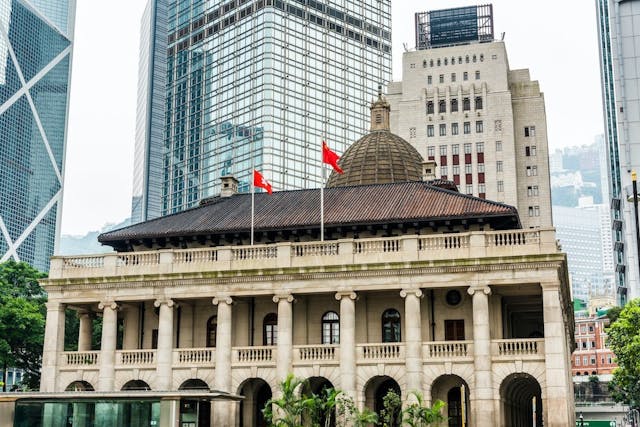
On May 19, the secretary-general of the SCNPC, Yang Zhenwu, met Cheung’s delegation. The meeting was marked by the attendance of the director of the Legislative Affairs Commission of the NPC, Shen Chunyao, who is also the director of the Hong Kong Basic Law Committee. Zhang Yong, the deputy director of the Hong Kong Basic Law Committee, attended this meeting. It can be inferred from this meeting’s attendees that the high-level mainland officials responsible for the Hong Kong Basic Law exchanged their views with the senior judicial officials from the HKSAR – a rare but perhaps a new and significant communication pattern.
According to Wen Wei Po on May 22, Yang told Andrew Cheung’s delegation that the visit from the Hong Kong judiciary marked an “active attitude” towards mutual exchanges and he expressed his hope that such communication would be enhanced in the future.
More importantly, Yang introduced President Xi Jinping’s rule of law thought and its “richness” to the delegation. He hoped that the Hong Kong court judges would understand deeper the “substantial content” of how the Chinese constitution and the Basic Law can constitute the constitutional basis of the HKSAR. Moreover, the Hong Kong judges should, according to Yang, “understand the significance of the Hong Kong Basic Law, the Hong Kong national security law, and the resolutions of the SCNPC” so that “the principle of ‘patriots governing Hong Kong’ can be implemented” and that “the important function of the judiciary in maintaining the national sovereignty, security, developmental interest, and Hong Kong’s long-term prosperity and stability can be fully exercised.”
On May 20, Tang Yijun, the Minister of Justice, met Cheung’s delegation. Tang introduced how China has achieved great progress of governing the entire nation in accordance with the law. Tang remarked that “at present, we have to learn deeply Xi Jinping’s rule of law thought, maintain the principles of Party leadership, of the people as the master, and of governing the country by law and in an organic and united way.” Under these circumstances, Tang said, “utilizing the law to govern the country, to lead the regime, to promote the progress of the executive, to rule the nation-state, to integrate the society and its construction, to promote scientific legislation, and to propel the people to obey the law can create a new scenario of governance by the law.” Tang’s remarks appeared to be highly legalist, introducing the new thought of Chinese legalism to the Hong Kong delegates.
Tang added that, in recent years, Ministry of Justice has been interacting and cooperating with the Hong Kong judiciary. As with Yang Zhenwu, Tang Yijun expressed his hope that both sides would strengthen collaboration and communication to achieve the objective of “fully, accurately, effectively implementing the constitution, the Basic Law and the Hong Kong national security law.” In this way, according to Tang, China’s national sovereignty and security can be protected, Hong Kong’s prosperity and stability be maintained, and the renaissance of the Chinese nation would be realized.
In response to the remarks from the Chinese judicial officials, Andrew Cheung said that the delegation expressed its gratitude to the concern and care expressed by the Chinese judiciary. He also expressed his wish to promote further exchanges and cooperation, especially in the technological application in the judiciary. Cheung added that this visit could strengthen the Hong Kong judiciary’s understanding of China’s development, including the rule of law development, judicial reforms, intellectual property rights protection, and the concept and application of smart judiciary.
On the morning of May 20, the Hong Kong delegation met the deputy president of the Supreme People’s Court, He Rong, who introduced how the mainland set up the intellectual property rights court and Internet court to be innovative and scientifically progressive. Both sides agreed to forge closer cooperation in deepening their mutual understanding of intellectual property rights protection and the establishment of a smart judiciary. Andrew Cheung expressed the delegation’s appreciation of the progress of China’s smart judiciary, and he said the Hong Kong judiciary has much to learn from the mainland experiences.
From the perspective of political analysis, Cheung’s delegation visit was politically significant in several aspects. First and foremost, the courtesy visit took place at a time after the implementation of the Hong Kong national security law and the publication of a paper by the Hong Kong judiciary on judicial reform. This courtesy visit has attracted considerable media attention at least from the patriotic media in the HKSAR. The last visit of the Hong Kong judiciary could be traced back to June 2016, when the former Chief Justice Geoffrey Ma led a six-member delegation to visit Beijing (Andrew Cheung was one of the six members). In July 2013, Chief Justice Geoffrey Ma had led a three-member delegation (Andrew Cheung was also one of them) to Beijing for a three-day visit. Ma had paid an earlier visit to Beijing in January 2011. However, all the three visits led by Geoffrey Ma in 2016, 2013 and 2011 were not covered extensively in the Hong Kong media. Ma’s predecessor, Andrew Li Kwok-nang, visited Beijing in September 2004 with six other judicial officials, including Geoffrey Ma at that time. From 1999 onwards, Hong Kong court judges have trained mainland judges through a program at Tsinghua University.
Second, the content of the Hong Kong delegation’s visit from May 18 to 21 was quite different from that of the past courtesy visits. The mainland judicial officials, such as Yang Zhenwu and Tang Yijun, highlighted the importance of the Hong Kong judiciary in implementing “fully” and “accurately” the Chinese constitution, the Basic Law and the Hong Kong national security law so that China’s sovereignty, national security and developmental interest can be protected. They also emphasize the importance of President Xi Jinping’s rule of law thought. Given the fact that the mainland judicial tradition has blended the judicial operation with the executive branch, the mainland emphasis on the “accurate” implementation of the Chinese constitution, the Basic Law and the Hong Kong national security law can be regarded as both new and unprecedented. In other words, the Hong Kong court judges are expected to learn more from the mainland’s rule of law practices and thinking, although the Hong Kong common law system remains quite different from the mainland law in both context and content.
Third, the Hong Kong judiciary has much to learn from the mainland counterpart, especially the concept and application of smart judiciary. Mainland courts have been utilizing the Internet and technology for meetings, hearing cases, and handling the judicial documents and cases in a far more effective and efficient manner than before. As such, the technological application of the Hong Kong judiciary can learn more from the mainland practices.
Fourth, the mainland judicial officials and legal experts responsible for the Hong Kong Basic Law met the Hong Kong delegation – a new phenomenon pointing to more communication and exchanges from the two sides in the coming years.
In conclusion, Chief Justice Andrew Cheung’s delegation visit to Beijing was unprecedented. Although it could be seen just as a regular courtesy visit, such a visit displayed a new pattern with new characteristics. This new pattern is characterized by the mainland judicial expectations that both sides can learn from each other and enhance mutual exchanges, and that the Hong Kong court judges can and will enhance their understanding of the need to implement “accurately” and “fully” the Chinese constitution, the Basic Law and the Hong Kong national security law. Another important characteristic is that Hong Kong court judges are increasingly expected to understand deeper the mainland’s rule of law thinking and practices. As such, the May 2021 visit of the Hong Kong judicial officials to Beijing was a watershed, marking the closer collaboration and deeper understanding between the members of the judicial branches of the two sides.
原刊於澳門新聞通訊社(MNA)網站,本社獲作者授權轉載。



